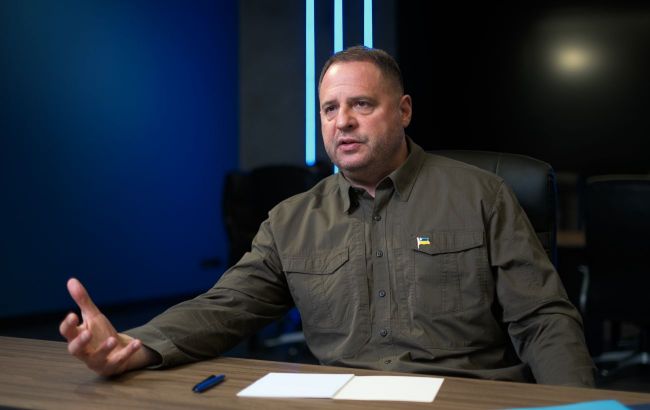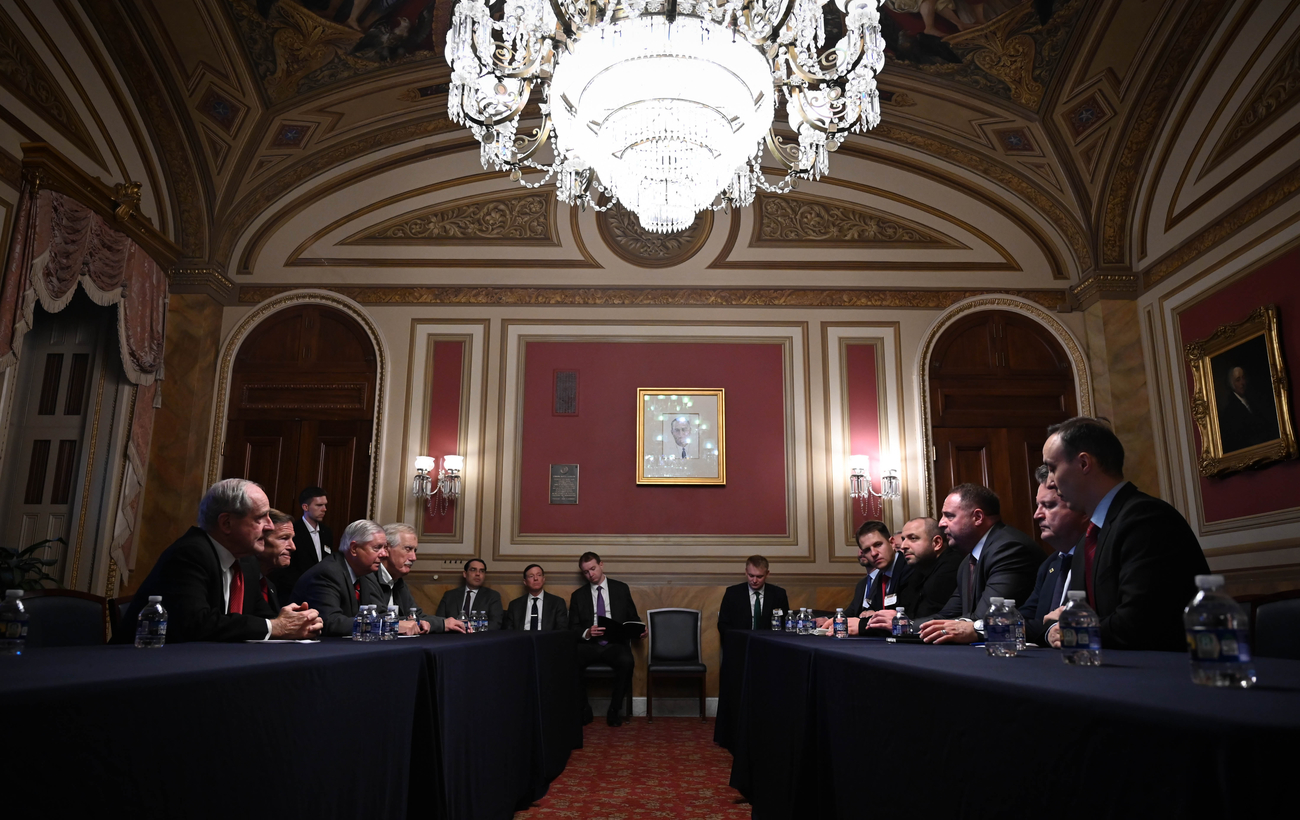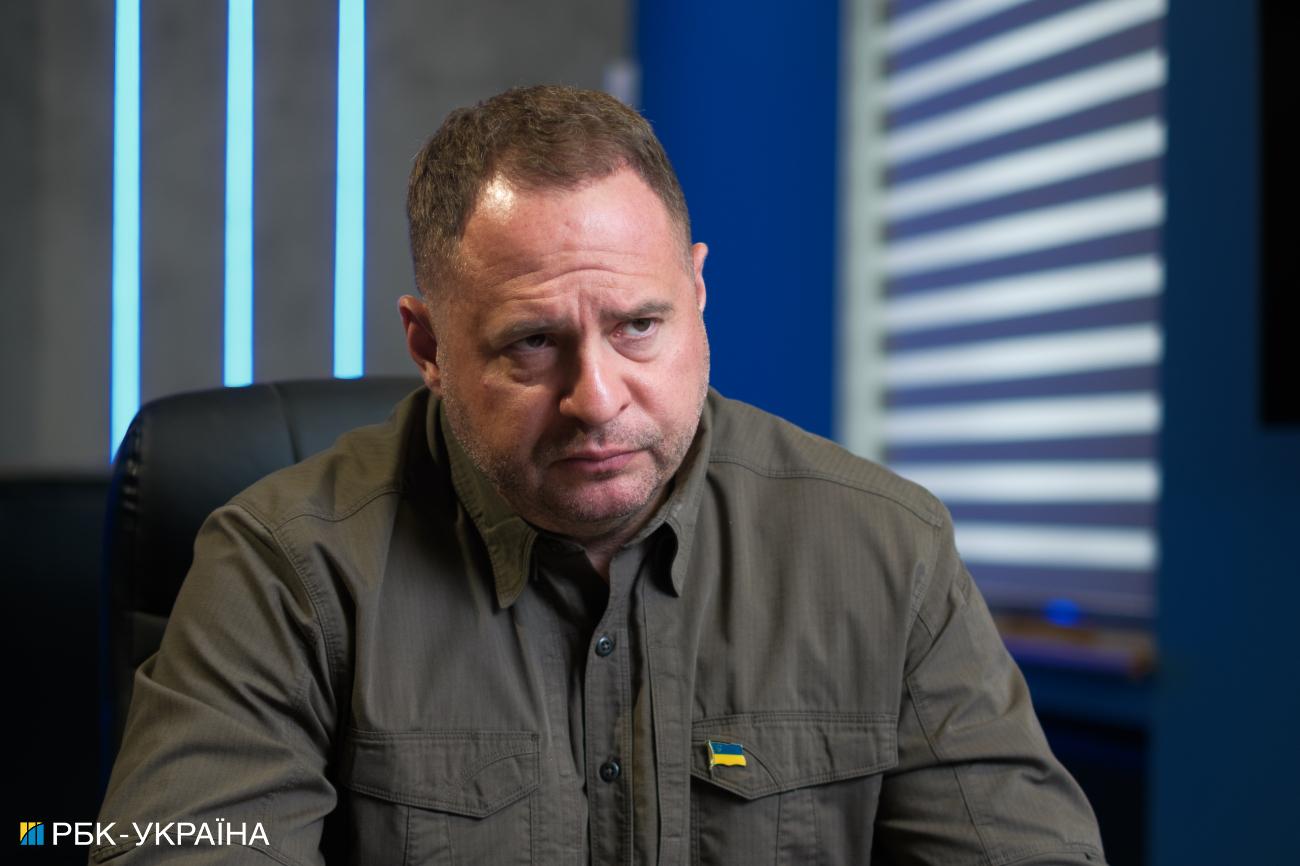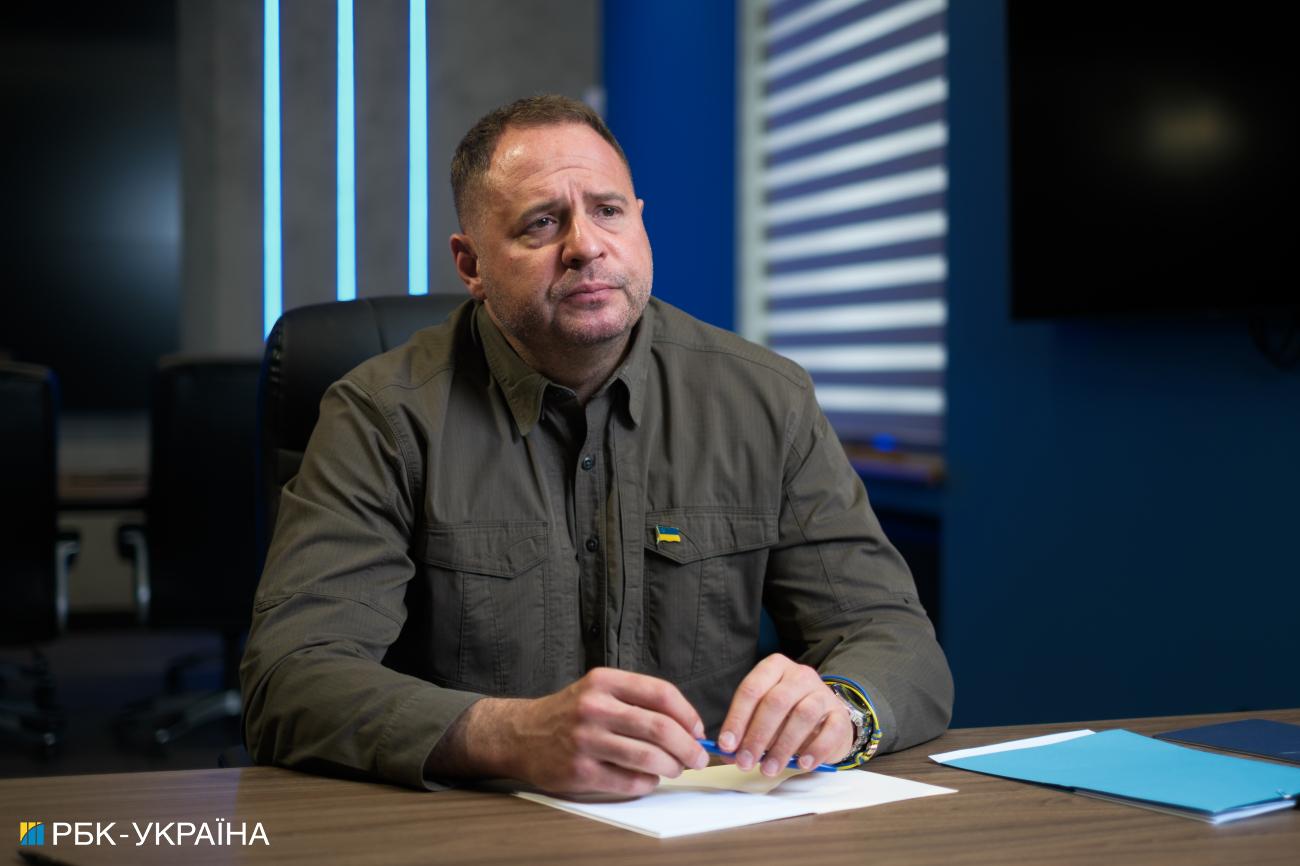'Ending war in Ukraine is Trump's priority.' Interview with head of Zelenskyy's office Andriy Yermak
 Head of the Ukrainian Presidential Office Andriy Yermak (all photos by Vitalii Nosach / RBC-Ukraine)
Head of the Ukrainian Presidential Office Andriy Yermak (all photos by Vitalii Nosach / RBC-Ukraine)
About the recent meeting between Volodymyr Zelenskyy and Donald Trump, the supply of Tomahawks, Ukraine's position on ending the war, attacks on Ukrainian infrastructure, and retaliatory strikes against the aggressor, as well as the fact that time is working against Russia – read in the interview with the Head of the Presidential Office, Andriy Yermak, for RBC-Ukraine.
Key questions:
- How did the meeting between Zelenskyy and Trump actually go?
- Could Trump and members of his team come to Kyiv?
- How closely do Ukraine and the United States share a vision of ending the war?
- Will Russia be able to freeze Ukraine this winter?
When it seemed that the negotiations on ending Russia's aggression against Ukraine had entered another prolonged pause, US President Donald Trump once again accelerated the course of events. After two phone conversations with Volodymyr Zelenskyy, he invited the Ukrainian President to the White House.
However, on the eve of the Friday meeting, Trump unexpectedly spoke with Vladimir Putin again. Following that call, he announced an upcoming personal meeting with the Russian President in Budapest, with his favorite timeline — within the next couple of weeks.
The meeting with Zelenskyy, according to numerous US media reports, was not as warm as the Ukrainian side had expected. In particular, Ukraine will not yet receive American Tomahawk missiles, which would have been very useful for conducting deep strikes on the aggressor's territory. Overall, the atmosphere behind closed doors was reportedly agitated.
However, the Head of the Presidential Office, Andriy Yermak, in an interview with RBC-Ukraine, denies that the latest round of talks with Trump went poorly. "After the meeting at the White House, the vision of President Trump and President Zelenskyy — that we need a ceasefire along the current front line — completely coincides," Yermak said.
In addition, the Head of the Presidential Office agrees that Trump does not need a repeat of the de facto fruitless summit in Alaska — he will be ready to meet with Putin only when such a meeting can bring concrete results.
Apparently, that is why a new phase of uncertainty has also suddenly begun in the peace negotiations — since, following the previous conversation between Secretary of State Marco Rubio and Russian Foreign Minister Sergey Lavrov in Washington, it became clear that Moscow is still not ready for any real concessions or serious peace talks. Therefore, Trump canceled the Budapest meeting altogether.
– There has been a lot of information in the American media about how the meeting between Presidents Trump and Zelenskyy went on Friday. The details differ, but the general tone is clear: the meeting was not a disaster, but it went worse than expected. How accurate is that?
– I'll start with the key point — the meeting with Donald Trump. I disagree with the assessment that it went poorly. Yes, we did not get all the decisions we had hoped for right here and now: the call from Putin undoubtedly played its role. But this was not a sprint for instant victories — instead, it was the laying of a foundation for further work. The main thing is that the conversation ended with the confirmation of our shared strategic position: any negotiations and, as a result, a ceasefire are possible only with reference to the current line of contact.
At the same time, for a complete picture, it is essential to understand that this meeting was not the only one during our five-day visit to the United States. Our delegation — which included Prime Minister Yulia Svyrydenko, Secretary of the National Security and Defense Council Rustem Umerov, First Deputy Minister for Foreign Affairs Sergiy Kyslytsya, and Minister of Economy, Environment, and Agriculture Oleksii Sobolev — had a very intense and productive schedule. And this, during a government shutdown!
Despite the suspension of the US government's work, we successfully heldseveralf critical negotiations: in Congress, there were meetings with senators, members of the House of Representatives, and committee chairs, while in the Administration and various agencies we held talks with the Secretary of State, Acting US National Security Advisor Marco Rubio, the Special Envoy for Ukraine, General Keith Kellogg, at the State Department, as well as at the Pentagon.
In addition, we had extensive communication with opinion leaders and experts. I would especially note crucial meetings with the leadership of major defense companies — Lockheed Martin and Raytheon.
At the same time, our new ambassador, Olga Stefanishyna, appointed less than two months ago, was already actively involved in all processes, while government officials had a separate program within the IMF Week (the annual meetings of the International Monetary Fund and the World Bank), which took place at the same time.
Strong support for Ukraine in American society remains — as seen in the latest polling data. People continue to advocate for the continuation of military and financial assistance, for strengthening sanctions against the aggressor state, and for the return of deported Ukrainian children. And in any democratic country, the government always takes into account voters' opinions.
Therefore, assessing the visit as a whole, we can — and should — speak of significant progress at all levels. By the way, in the coming days, this progress will become visible and tangible. Washington has prepared a series of legislative initiatives announced on Wednesday that will be very painful for the aggressor state across several areas at once.
 Meeting of the Ukrainian delegation (Andriy Yermak, Rustem Umerov, Sergiy Kyslytsya, Vladyslav Vlasiuk) with members of the US Senate (photo: Presidential Office press service)
Meeting of the Ukrainian delegation (Andriy Yermak, Rustem Umerov, Sergiy Kyslytsya, Vladyslav Vlasiuk) with members of the US Senate (photo: Presidential Office press service)
– Let's return to the meeting at the White House. Do I understand correctly that during the conversation, other parameters for a ceasefire were initially discussed?
– There was a discussion. Naturally, during it, they also mentioned what Putin had said during his conversation with Trump.
– Did they convey the Russian position?
– They presented it. However, the Russian position is not the United States' position. The US position — and Trump made this clear — is that negotiations must start from the current line of contact. But we all understand that, as in Gaza, this is impossible without a ceasefire. Russia must not be allowed to continue the war under the cover of negotiations, thereby slowing down the introduction of new sanctions and the increase of assistance to Ukraine.
In addition, we received full confirmation of support regarding air defense, primarily concerning the Patriot systems. This support is multi-component, and I cannot disclose all the details. Of course, the most effective systems are the newest ones, but there is a very high demand for them. Figuratively speaking, there is a long queue, but we are trying to be as close to the delivery window as possible. The most important thing here is that Trump gave the green light, so the remaining issues are primarily technical.
Moreover, the PURL program for purchasing American weapons is actively operating, and 17 countries have already joined it in Brussels. A strong public speech by Defense Secretary Pete Hegseth also facilitated this. As for additional weapons, there was neither a yes nor a no. By the way, the Tomahawks are far from the only thing that can be discussed. The dialogue continues, and I would not say that these doors are closed.
– Are the Tomahawks considered a military game-changer or a tool of psychological pressure on the aggressors?
– The position of the President and the entire team is apparent and unchanged: no agreements without the participation and support of Ukraine. This is a clear red line that everyone can see.
– And your Friday interlocutor as well?
– Absolutely, he understands everything. Of course, we would like faster decisions on some issues, because in wartime, a country moves very differently. But on the other hand, this was probably the first truly partnership-based conversation behind closed doors — remarkably frank and open. Yes, in some things our views coincided, and in others they did not, but I would not make a tragedy out of that. This discussion will definitely continue.
– Do you have the impression that the US President no longer needs another Alaska No. 2, with general phrases about how well they talked? That he will go to the next meeting with Putin only with specifics, as in the case of Gaza, when there was a concrete document with concrete points and a concrete result?
– I think so. Obviously, for Trump, ending this war truly remains a priority, and that is a good thing. He says he wants to achieve the best outcome for Ukraine. Accordingly, our task is to constantly remind ourselves and keep in focus what we consider best for ourselves, so that our partners understand our position and realize that Ukraine will not accept any other terms.
Unfortunately, Russian propaganda works on a massive scale, and we must acknowledge that. It operates systematically, everywhere, around the world. Therefore, under no circumstances can we allow the Russians to portray our firm position as a reluctance to end the war.
We have managed, for an unprecedentedly long time, to maintain a very high level of support for Ukraine in the United States. All polls confirm this. But we must not forget that every country has its own problems — both internal and external.
That is why our task is to always remain as constructive as possible with our partners. It is essential to make them understand that Ukraine, more than anyone, wants the swiftest possible end to the war unleashed by Russia. But our state deserves only a stable and just peace.
– What kind of activity should we now expect specifically on the American track? Phone calls, perhaps another trip to the US, or maybe someone from the American side will come here to us?
– We are in constant contact. I probably don't publicly report even half of my phone conversations with the Americans.
– Why?
– Because for me, the result matters more than the fact of communication itself. The dialogue is ongoing at all levels. My main interlocutors are the Secretary of State and the Acting US National Security Advisor, Marco Rubio. But I also speak with senators, members of Congress, heads of relevant committees, opinion leaders, and special representatives. These contacts never stop. They will continue this week and next week. We clearly feel openness and interest in such a format of dialogue from the American side.
We are sincerely grateful to everyone who has found the opportunity to visit our country. This includes the US President's Special Envoy for Ukraine, General Keith Kellogg, who has already visited several times; US Treasury Secretary Scott Bessent; and numerous members of Congress and senators who have been coming to us since February 24, 2022, and, of course, American journalists.
That is why we believe that visits to Ukraine by top US officials such as Secretary of State Rubio, Vice President JD Vance, Speaker Johnson, Defense Secretary Hegseth, and, of course, President Trump himself are essential as soon as the opportunity arises. I am deeply convinced that only by visiting Ukraine can one truly understand the situation and feel the strength and spirit of our people. You can repeat certain things a hundred times, but it is better to see everything with your own eyes once. Therefore, without exception, every one of our meetings at any level ends with an invitation for our American partners to visit Ukraine.
 – If we don't take President Trump into account, is the visit of any of the other top members of his team, whom you mentioned, realistic by the end of the year?
– If we don't take President Trump into account, is the visit of any of the other top members of his team, whom you mentioned, realistic by the end of the year?
– I can't say that there are already any confirmations. But it seems to me that such a visit is more realistic today than it was before our last trip. And that is another concrete result.
To understand why, let's recall the story with the weapons — for example, with the Tomahawks. Perhaps someone feels disappointed now, but is this the first time? After all, we have never been given anything on the first request. Neither the Patriots, nor the HIMARS, nor the ATACMS — nothing ever appeared after the first request.
Many countries have spent decades developing mechanisms for working with the American establishment. Israel did it, Hungary did it, Russia did it, and many others. Ukraine had not previously paid enough attention to these issues. But today, the kind of relationship that President Zelenskyy and our team have built with the Americans — Ukraine has never had such relations with America before.
– But how closely do the interests of Ukraine and the United States, which Trump naturally prioritizes, align now in the context of the war and its end?
– They have the principle of America first, and we have Ukraine first. I fully support such an approach. Let's unite, and our two countries will be first.
At the same time, after the meeting at the White House, the visions of President Trump and President Zelenskyy — that we need a ceasefire along the current front line —coincide entirely.
We have managed to change the situation radically. Just a few months ago, many in America believed that Ukraine was losing and Russia was winning the war. That is no longer the case today.
– Did Trump also believe that?
– In any case, he was not convinced that Ukraine was resisting successfully enough and was capable of delivering painful blows in response to the enemy.
– Why?
– Possibly due to a lack of information. That is no longer the case. Today, absolutely everyone sees and acknowledges our successes. And every time Trump mentions it, he says he is impressed by what Ukraine has managed to achieve in terms of its own weapons production during the war. It is unprecedented, and he always emphasizes that.
We have established working, constructive contacts between the presidents of Ukraine and the United States. President Zelenskyy and President Trump can call each other twice within two days. As for meetings, this was the third visit to the White House. There were also meetings in the Vatican, The Hague, and New York.
In other words, the dialogue continues. But that does not mean it always has to bring a 100% result. Of course, we would like that very much, and believe me, we are making every effort. However, sometimes it takes a lot of effort and time to achieve a result.
– Let's move on to more domestic matters. How high is the risk that Russia, through its shelling, will be able to freeze us this winter? Do we have the money and resources, for example, to purchase additional gas?
– Russia has been trying to do this for all four years. Nothing new is happening. All these years, Russia has set itself the goal of leaving us without heat and electricity during the autumn and winter seasons. Nothing has changed.
Both President Trump and Energy Secretary Wright — with whom President Zelenskyy and Prime Minister Svyrydenko met with leading US energy companies — as well as Treasury Secretary Bessent, all understand this. They are ready to help us as much as possible to get through this winter.
– With what? Air defense, gas, money, equipment?
– I already spoke about air defense. Our delegation included Energy Minister Svitlana Grynchuk and representatives of Naftogaz (Ukraine's state-owned oil and gas company). A clear list of what we need was handed over to the Americans. And our American partners, as well as the Europeans, are ready to help us with this.
As for the risks — of course, they exist. As long as this war continues, the risk of further strikes is inevitable. We will continue doing what we have been doing: defending, rebuilding, and developing. The President devotes a lot of time to this every day; the Prime Minister, the Energy Minister, and other members of the government visit the attack sites. They respond immediately. And if the tasks set are not fulfilled, or are performed poorly or belatedly, strict personnel and organizational measures are taken immediately.
– Should we expect an expansion of retaliatory strikes against the aggressors? And will production of the Flamingo increase to seven units a day, as reported in the media?
– We have been responding and will continue to respond. Strikes against the aggressor will intensify. Let us look at the results, not discuss preparations for these strikes. I cannot comment further.
– Without the transfer of Russia's frozen assets to us, even in the form of a reparations loan, can we manage financially in the medium term?
– Why assume we must manage without them? I see fairly positive signals. I do not want to get ahead of myself, but so far, an adverse scenario on this issue is not apparent. The PURL format is working well, and several other platforms are operating successfully.
Overall, I think our country is a family into which misfortune — war — has come. But this family is strong. It is united, and in that unity lies its resilience. So preserving it is extremely important; minor disagreements must not harm it: a fist is always stronger than spread fingers.
Finding funds, convincing partners to continue supporting and helping us — all of this is being achieved under difficult conditions for the same reason: we have a shared will and a common goal.
– If hostilities continue and we accept that as the baseline scenario, should we expect new counteroffensives on some sectors of the front by spring?
– I can only comment on the real situation. It isn't easy, but controlled — and this has remained a constant. It is precisely Putin's lack of successes on the battlefield that has led to an increase in terrorist strikes against civilian targets in Ukraine. Putin, of course, continues to lie about his accomplishments, but what else can he do except create illusions?
The Russians still believe they are getting stronger. But that is not the case. They are in a weak position. And time is working against them. They are literally paying for it with soldiers' meat.
But unlike dictatorial regimes, where human life is worth nothing, for us, the life of every person is the highest value. Moreover, every Ukrainian who is here today, in their country, is a hero. And they must know this. Soldiers, medics, energy workers, rescuers, teachers, businesses, journalists, etc. — they are all heroes.
And as for Russia… Russia has not changed its plans. It will be ready to end the war only when it realizes that its continuation will ultimately destroy it.

– Is this a one-time event or a process? In other words, does a single event have to happen — Tomahawks, high tariffs, something else?
– It's a process. It all works as a system. Everything adds up to a collective result. Sanctions cannot stop the war instantly, but they erode the Russian economy. Sanctions against the shadow fleet hit it very hard. Our deep strikes, operations like Spiderweb — all of this together — further weaken the aggressor.
The Russians already understand: Greater Russia — well, we can reach them everywhere. The war has already moved onto their territory. Any empire, any dictatorship is built on violence, and some submit to it for various interests. But there are also many — even the majority — who are afraid. And when the empire begins to wobble, when it starts to crack at the seams, fear weakens. Inevitably, completely unexpected scenarios appear. We don't see them yet, but I think it won't be long.
– Centrifugal tendencies?
– Formally, Russia is supposedly a voluntary union of peoples. But how is it in reality? Not everyone joined it voluntarily. And not everyone is comfortable there. Russia is a parody of the Union of Soviet Socialist Republics (USSR). And I wouldn't rule out that it might share the same fate.
In international politics, Moscow pretends to be a friend to many, but everyone knows the price of that friendship. And I am sure that no one wishes for Russia's victory. Because everyone knows what unlimited power in Russia means.
– Even China?
– Everyone.

